Ata-ul-Haye Nasir, Al Hakam
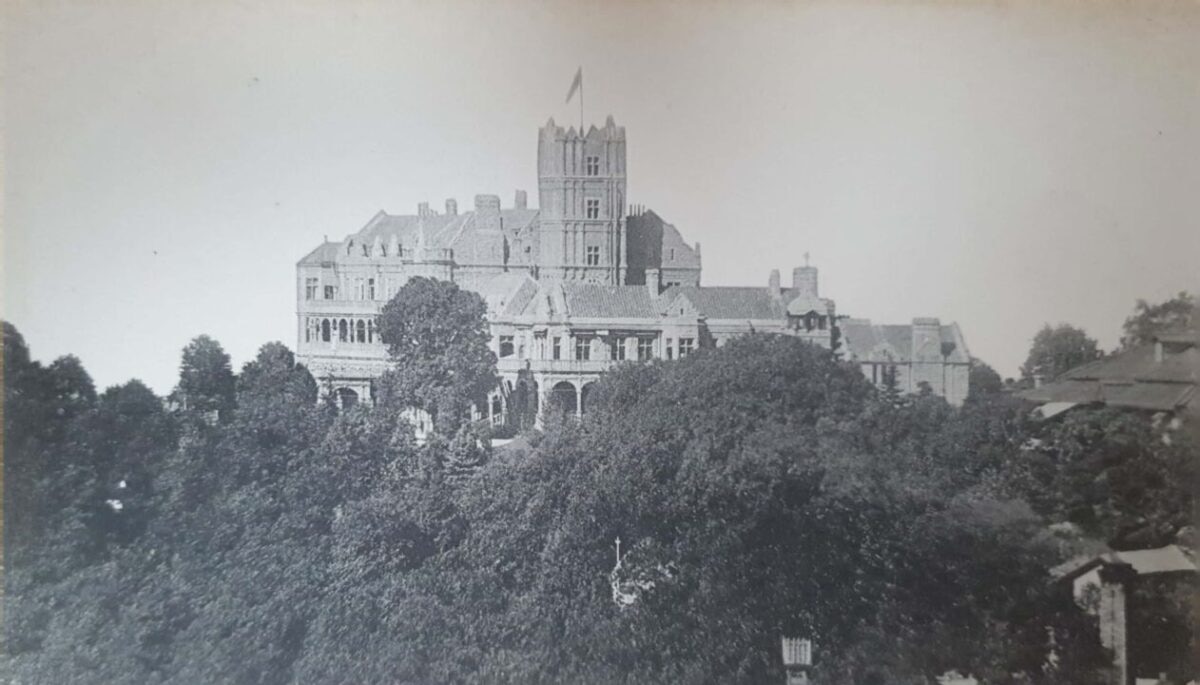
Hazrat Musleh-e-Maud, Mirza Bashiruddin Mahmud Ahmadra, visited Simla [now Shimla] from 13 August to 2 October 1927. Throughout this tour, Huzoor’sra activities were focused on religious, national, and community matters. Various leaders and dignitaries had the opportunity to meet him, including the then Viceroy of India and the then Governor of Punjab.
The ‘circumstances’
These seven weeks hold great significance considering the prevailing religious and political tensions. “Nationalism faced challenges from various quarters, but communal insecurities of minorities, be it at the centre or the province, formed the major hurdle.” (Mehta, Simmi Kapoor. “PUNJAB POLITICS 1922-1934.” Proceedings of the Indian History Congress 75 (2014): 536–45. www.jstor.org/stable/44158428)
The rift between the Hindu and Muslim communities was intensifying, particularly following the Shuddhi Movement and the publication of disrespectful literature against the blessed character of the Holy Prophet Muhammadsa, for instance, Vichitra Jivan by Pandit Kalicharan Sharma (1923), the booklet Rangila Rasul by Pandit Chamupati (1924), and an article titled Sair–i–Dauzakh by Devi Sharan Sharma in the May 1927 issue of Risala-i-Vartman. Moreover, the political disagreements were making the picture even worse. The division among the Muslim leaders on certain matters, such as the Delhi Proposals of 1927, was also a source of concern for the Indian Muslims.
Keeping in mind the above-stated circumstances, during his meetings in Shimla, Hazrat Musleh-e-Maudra made full efforts to guide the Indian leaders towards a solution to the ongoing conflict. Huzoorra also advised the government to take necessary steps to foster peace and harmony within the country, and particularly urged them to ensure that the respect and honour of the holy founders of all religions is safeguarded. As stated earlier, these events hold great significance in the history of British India, since they played a great role in redirecting the mindset of many leaders and officials, and eventually crafted a new chapter in history.
Huzoor’sra press release from Shimla in response to the verdict on the Vartman case
On 6 August 1927, the High Court of Lahore concluded the case of Risala-i-Vartman; the author was sentenced to a year of imprisonment and a fine of 500 rupees in lieu of an additional six months of imprisonment, and the publisher was sentenced to six months of imprisonment and a fine of 250 rupees in lieu of an additional three months of imprisonment. Upon this, Huzoorra issued a press release from Shimla on 22 August 1927, which was published in The Civil and Military Gazette.

In this press release, Huzoorra called the attention of the government to making some amendments to the law and advised them to take steps that are necessary to safeguard the honour of the holy founders of all religions. (The Civil and Military Gazette, 26 August 1927, p. 15)
Huzoor’sra guidance in light of the Delhi Proposals
Let us now look at the circumstances from the perspective of Muslims; one significance of these meetings and gatherings was due to the difference of opinion among the Muslim leaders after the Delhi Proposals of 1927. The Muslims of the Indian subcontinent presented many demands from time to time and all of them had their own importance, but the demand for separate electorates was a special one. People often assert that from the beginning, MA Jinnah was a strong advocate of separate electorates, as this point was among his famous Fourteen Points, however, this is completely wrong.
On 20 March 1927, Muslim leaders had a meeting in Delhi – presided over by Jinnah – to discuss the basic demands of the Muslims, including separate electorates. Though they included the separate electorates in their demands, they also agreed to compromise on this demand provided all other demands were accepted by the Indian National Congress. These proposals are commonly known as “The Delhi Proposals”. (Quaid-e-Azam Aur Unka Ehad – Hayat-e-Muhammad Ali Jinnah, by Raees Ahmad Jafri, p. 137)
It became apparent very soon that the Muslim leaders were divided on the question of separate electorates; MA Jinnah and Maulana Muhammad Ali were against it, while Sir Shafi and Sir Abdur Rahim were in favour of this demand. Following this development, Hazrat Musleh-e-Maudra raised his voice in favour of the separate electorates, since he believed that, considering the then circumstances of India, the greater interest of the Muslims was in sticking to this very demand.
Hazrat Musleh-e-Maudra invited the leaders of various provinces to Kingsley, his place of stay in Shimla. For instance, he invited Jinnah to a tea party, and discussed the issue of separate electorates. Jinnah argued that nationalism could only be inculcated through joint electorates. Huzoorra responded that he agreed to the extent that joint electorates are essential for nationalism, however, considering the circumstances at the time, when the Muslims were weaker and unable to cope with the power and the majority of Hindus, separate electorates were the need of the time. But Jinnah did not agree to quit his stance. (Tarikh-e-Ahmadiyyat, Vol. 4, pp. 619-620)
Viceroy’s address and call for peace
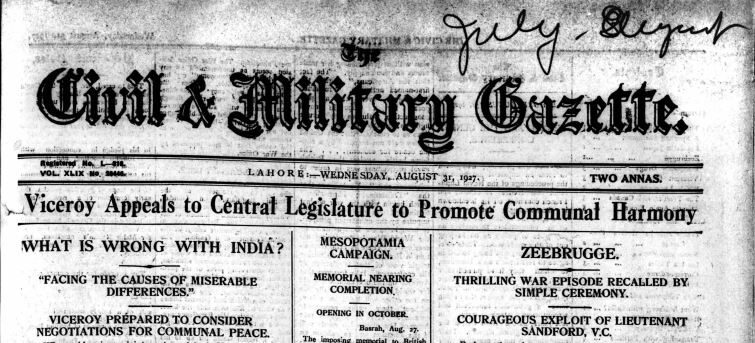
On 28 August 1927, the Viceroy of India delivered a speech to the members of the Council of State and the Legislative Assembly, in which he emphasised the need to make peace between the Hindu and Muslim communities.
The Civil and Military Gazette reported:
“A conference to discuss the present communal tension in India was foreshadowed by Lord Irwin in his address to the joint session of the Council of State and the Legislative Assembly today. […]
“The Viceroy said:
“‘A little more than a year ago, I invited India to pause and seriously consider the communal situation, and I then appealed to leaders and the rank and file to pursue peace and cultivate a spirit of toleration towards one another. […] Let me recall the salient incidents of India’s recent history. I am not exaggerating when I say that, during the 17 months that I have been in India, the whole landscape has been overshadowed by the lowering clouds of communal tension, which have repeatedly discharged their thunderbolts, spreading far throughout the land their devastating havoc. From April to July last year, Calcutta seemed to be under the mastery of some evil spirit, which so gripped the minds of men that, in their insanity, they held themselves absolved from the most sacred restraints of human conduct. […] Since then we have seen the same sinister influences at work in Pabna, Rawalpindi, Lahore and many other places, and have been forced to look upon that abyss of unchained human passions that lies too often beneath the surface of habit and of law. In less than 18 months, so far as numbers are available, the toll taken by this bloody strife has been between 250 to 300 killed, and over 2,500 injured.’” (The Civil and Military Gazette, 31 August 1927, p. 1)
At the end of his speech, he said:
“I believe – and I think India believes – in the power of spiritual forces to assert themselves over their material expression, by which they may often be betrayed.” (Ibid, p. 7)
The Western Morning News and Mercury stated:
“Lord Irwin’s conference might be fruitful of good results, but it is questionable whether better and more immediate good would not follow the suppression of publications whose sole purpose is the stirring up of hatred.” (The Western Morning News and Mercury, 31 August 1927, p. 4)
Hindu and Muslim leaders agree to hold a Unity Conference
“In August 1927, as an immediate result of the agitation started in connection with the ‘Rangila Rasul’ pamphlet, Maulana Shaukat Ali wrote on behalf of the Central Khilafat Committee to Dr Moonji, President of the Hindu Maha Sabha, requesting his [sic] to agree to the calling of a meeting when representatives of the Central Khilafat Committee and the Hindu Maha Sabha could meet and discuss the communal situation and try and discover remedial measures. Dr Moonji promptly responded to this invitation and as a consequence, a conference was summoned at Simla.” (The Indian Quarterly Register, July-Dec 1927, Vol. II, p. 39, The Annual Register Office, Calcutta)
The outset of the Unity Conference
On 29 August, a meeting was held between the Hindu and Muslim leaders:
“The conference convened at the invitation of the Khilafat leaders was held this evening, when a large number of Congress leaders and prominent members of the Hindu Sabha were present. Mr MA Jinnah presided. […] It was agreed that a list should be prepared of the points of difference between the two communities for submission to a meeting of leaders to be held on September 6. It was agreed that the list should be handed over to Mr Jinnah on or before September 10.” (The Englishman, 1 September 1927, p. 7)
During the meeting, a suggestion was tabled by Dr Gokalchand Narang to make an appeal to the public and press to calm the tense atmosphere. (The Civil and Military Gazette, 2 September 1927, p. 16)
On 30 August, a session of the Unity Conference was held at the Council Chamber, where Hazrat Musleh-e-Maudra delivered a speech, shed light on the methods for achieving peace between all communities, and advocated the protection of the economic rights of Muslims. (Tarikh-e-Ahmadiyyat, Vol. 4, p. 614)
The Civil and Military Gazette reported:
“The Unity Conference met again this afternoon to approve the draft appeal prepared by Mr Quereshi and Dr Narang. Mr Jinnah was in the chair. […] Pandit Malaviya characterised the appeal as a solemn document and said that they were earnestly determined to find a solution to Hindu-Muslim differences. […] The appeal was then signed by a very large number of Hindu and Muslim leaders now in Simla, including the members of the Central Legislature.” (The Civil and Military Gazette, 2 September 1927, p. 16)
Huzoor’sra proposals for peace and harmony
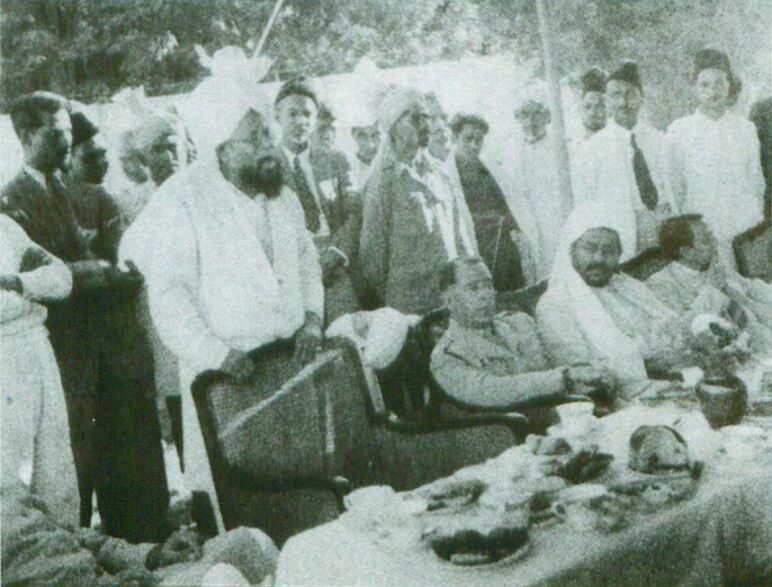
Since it was decided during the meeting on 29 August that a list of points of difference between the two communities be submitted to the conference, Hazrat Musleh-e-Maudra published a 20-point memorandum on 1 September, that outlined his proposals for the establishment of peace and harmony between Hindus and Muslims. The memorandum was sent to the leaders of both parties.
One of those points stated that the idea of joint electorates is correct in principle, but not under the prevailing circumstances in India and that it is detrimental to Muslim interests. Huzoorra said that the Ahmadiyya Muslim Jamaat, and other Muslims of Punjab and some other provinces were not ready to accept the joint electorates at the time. He demanded that the right to separate electorates continue for the Muslims, and for other parties as well, if they deemed it beneficial. (Appendix to Al Fazl, 16 September 1927)
The Viceroy meets Hazrat Musleh-e-Maudra
On the same day, 1 September, a meeting took place between Hazrat Musleh-e-Maudra and the then Viceroy of India, Lord Irwin, at the Viceregal Lodge. (The Civil and Military Gazette, 4 September 1927, p. 3)
During the meeting, Hazrat Mufti Muhammad Sadiqra was also present as an interpreter. The meeting continued for around 30 minutes, during which the ongoing political and religious situation in the country was discussed. Huzoorra advised the Viceroy to make full efforts to make peace between the Muslims and Hindus. (Al Fazl, 13 September 1927, p. 1)
The Unity Conference continues
On 7 September, during a session of the Unity Conference, Huzoorra presented his proposals, which had already been published as a memorandum on 1 September, and granted in-depth guidance in light of those points.
On the evening of 7 September, another session commenced under the chairmanship of Jinnah, at the hall of Brahmo Samaj Mandir, which was attended by various leaders from the Hindu and Muslim communities. Huzoorra delivered an address and spoke in favour of the Muslims’ demand for separate electorates and most of the speakers agreed with Huzoor’sra views. Jinnah, after delivering his concluding speech, stated that now he knew that the majority of the Muslims favoured separate electorates and thus, when the decisive time came, he would cater to their views. (Tarikh-e-Ahmadiyyat, Vol. 4, p. 620)
A subcommittee formed
The Civil and Military Gazette reported:
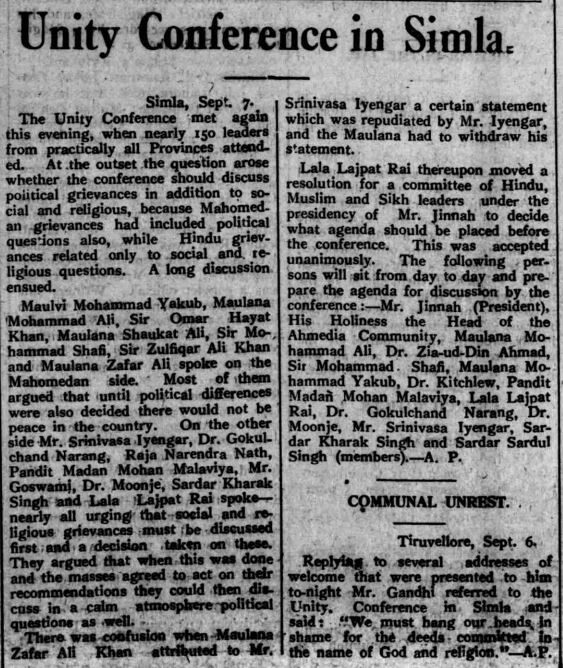
“The Unity Conference met again this evening, when nearly 150 leaders from practically all provinces attended. At the outset, the question arose whether the conference should discuss political grievances in addition to social and religious ones, because Mahomedan grievances had included political questions as well, while Hindu grievances related only to social and religious questions. A long discussion ensued. […]
“Lala Lajpat Rai thereupon moved a resolution for a committee of Hindu, Muslim and Sikh leaders under the presidency of Mr Jinnah to decide what agenda should be placed before the conference. This was accepted unanimously. The following persons will sit from day to day and prepare the agenda for discussion at the conference:
“Mr Jinnah (President), His Holiness the Head of the Ahmedia Community, Maulana Mohammad Ali, Dr Zia-ud-Din Ahmad, Sir Mohammad Shafi, Maulana Mohammad Yakub, Dr Kitchlew, Pandit Madan Mohan Malaviya, Lala Lajpat Rai, Dr Gokulchand Narang, Dr Moonje, Mr Srinivasa Iyengar, Sardar Kharak Singh and Sardar Sardul Singh (members).” (The Civil and Military Gazette, 9 September 1927, p. 5)
This subcommittee was to convene at 9am on the next day at the Cecil Hotel, located at the Chaura Maidan, nearby the Viceregal Lodge. Huzoorra reached there at the appointed time, however, some of the members were not yet present, and for this reason, the session did not take place on that day. (Al Fazl, 16 September 1927, p. 2)
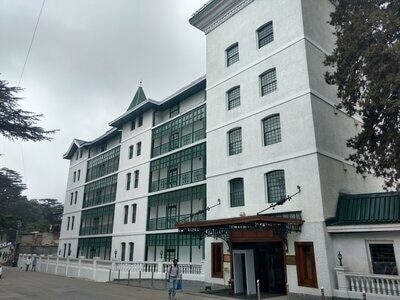
Thereafter, on 9 September, the subcommittee met at the Brahmo Samaj Mandir, where Jinnah presented the subcommittee’s report. “The recommendations of the sub-committee were unanimously accepted by the conference and Hindu, Sikh and Muslim leaders were appointed to propose a committee.” Hazrat Musleh-e-Maudra was also nominated as a member of this committee. (The Civil and Military Gazette, 11 September 1927, p. 13)
An appeal from the Conference to the public and press
“The conference regretted that, in spite of their appeal, three communal disturbances had occurred and that, in some sections of the press, the tone had not improved. They once more wished the public and the press to create a favourable atmosphere in the country in order that their efforts might be crowned with success.” (The Civil and Military Gazette, 12 September 1927, p. 7)
The above-mentioned newspaper published the names of all signatories to this appeal, which included the name of Hazrat Musleh-e-Maudra as well. (Ibid)
Simla Unity Committee
The Unity Conference nominated another committee known later as the Simla Unity Committee, which convened from 16 to 22 September, however, no conclusions were reached on some of the principal points. After some further discussions, the President was requested to summon a meeting if he received a requisition within six weeks from certain members. (The Indian Quarterly Register, July-Dec 1927, Vol. II, p. 40, The Annual Register Office, Calcutta)

A summary of the conference in Huzoor’sra words
Mentioning this conference, during a speech on 27 December 1927, Hazrat Musleh-e-Maudra said:
“A conference was held in Shimla, for which I was also invited as a member. […] During the conference, I would speak very little and instead assess the character of everyone. […] Thus, I am fully acquainted with them, and can say that there are some among them who are sincere in their efforts, however, there are some others who only act superficially. Nonetheless, I am pleased to see that there are some amongst the Muslims as well, who put their sincere efforts for the betterment of the Muslims, in accordance with whatever their intellect suggests.” (Taqrir Dilpazir, Anwar-ul-Ulum, Vol. 10, p. 78)
The only pathway to peace
Huzoorra further said:
“The truth of the matter is that true peace between different religions can only be achieved by utilising the means that have been taught by the Promised Messiahas. That is, the followers of all religions should narrate about the distinctive features of their respective religion, instead of raising objections over the others.” (Ibid)
Insincerity of political leaders
The purpose for which various leaders gathered at the Conference, required sincerity and true zeal from them to reach a solution. However, as Huzoorra said, many of those leaders were not sincere in their efforts and acted superficially. Due to the lack of much-needed sincerity from all of the political leaders, no significant solution could be achieved, however, there were many positive outcomes as well, particularly for the Muslims, which manifested their fruits later.
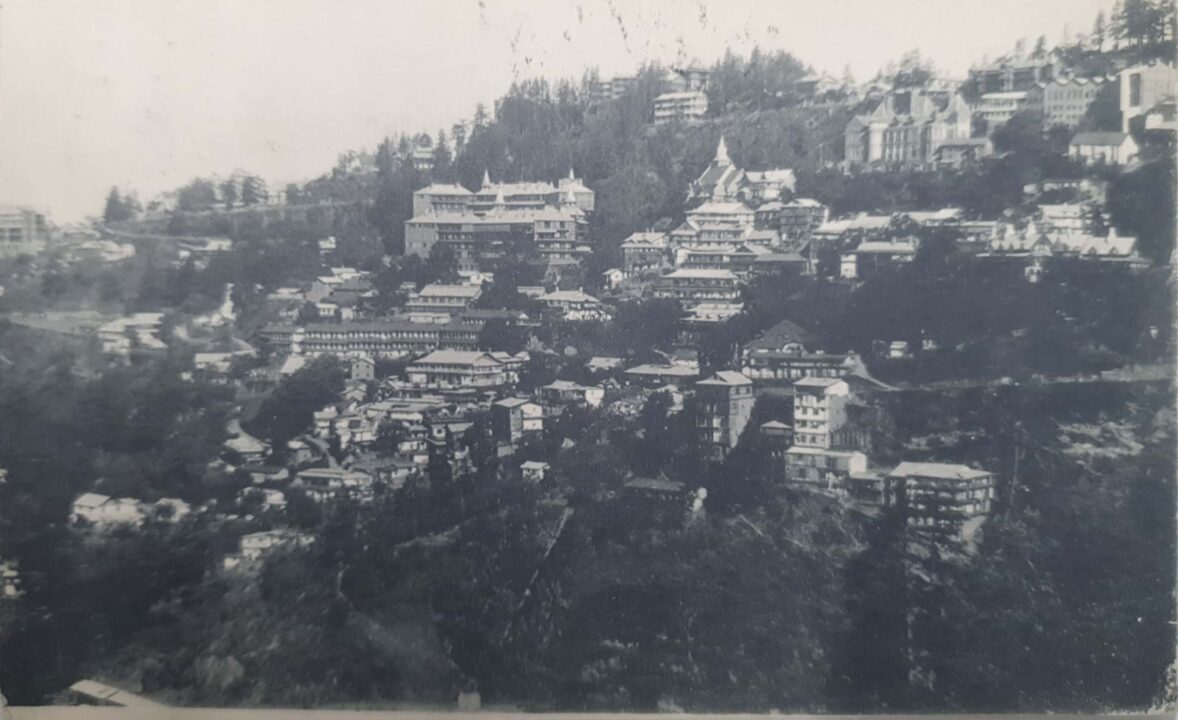
Significance of Huzoor’sra guidance to leaders and officials and its impact, in the long run
Hazrat Musleh-e-Maud’sra view in favour of the separate electorates had a great impact on Jinnah and other Muslim leaders, who were initially unable to realise how crucial this demand was under the prevailing circumstances. As a result, later on, Jinnah realised the importance of this demand and stood firm on it.
For instance, in 1928-1929, leaders of the Hindu Maha Sabha opposed the Muslims’ demand for the reservation of seats in Punjab and Bengal, and asserted that the Muslims did not require reservations in Punjab and Bengal as they were the majority there. In response to this, Muhammad Ali pleaded that “the small numerical superiority of the Muslims in these two provinces could be outweighed by the social power of Hindu Banias in Punjab and Hindu zamindars in Bengal since universal suffrage was not being introduced.” (Modern India, 1885-1947, Sumit Sarkar, p. 309, Macmillan India Limited, 1959)
It is crystal clear that Hazrat Musleh-e-Maudra considered that, though the idea of joint electorates was principally correct, it was not favourable amidst the situation of British India. Therefore, after the creation of Pakistan, when the question arose in regard to the introduction of joint electorates in West Pakistan, Huzoorra spoke in favour of the joint electorates. While mentioning this development, The Civil and Military Gazette reported:
“Muslim League and Jamaat-i-Islami circles yesterday criticised the National Assembly decision to have joint electorates for West Pakistan while its introduction was justified by the head of the Ahmediya Community, Mirza Bashiruddin Mahmood, due to changed conditions in the country. […]
“In a telegram from Rahmat to the Foreign Minister of Pakistan, Malik Firoz Khan Noon, Mirza Mahmood said that at one time he was of the opinion that a separate electorate should be continued in India. But now, he said, conditions had completely changed.” (The Civil and Military Gazette, 27 April 1957, p. 12)
Nonetheless, Hazrat Musleh-e-Maud’s guidance during his various speeches in Shimla and meetings with the Muslim leaders, helped instil a new passion and zeal among them to improve the political, social, and economic situation of the Muslims and to foster a sense of unity among them.
For instance, during his Friday Sermon on 9 September 1927, Huzoorra advised the Muslims that the principle which is required for their progress is in fact their religious progress, thus, “the more their power of faith and conviction grows, the more they will move towards progress.” (Al Fazl, 20 September 1927, p. 5)
Huzoorra granted valuable guidance to the leaders of other communities as well, and advised them as to how they could serve to establish a peaceful and harmonious society. Moreover, he also gave important guidance to various government officials, particularly the Viceroy of India and the Governor of Punjab.
In one of his articles, written on 8 December 1927, Huzoorra mentioned the Unity Conference of Shimla, and said that he became acquainted with various Muslim and Hindu leaders, who had the opportunity to work with him for several hours. Huzoorra said that he considers Jinnah an intelligent, able, and a sincere servant of the nation, and “he is among those very few who do not care for their personal fame as much as they care for the national progress.” However, Huzoorra also expressed his disagreement with Jinnah and his like-minded people about boycotting the Simon Commission, which was expected to arrive from England. (Musalmanan-e-Hind ke Imtihan ka Waqt, Anwar-ul-Ulum, Vol. 10, p. 45)
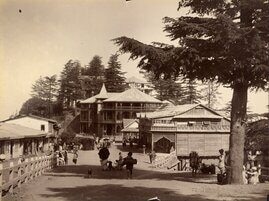
A lecture at the Elphinstone Hall
On 11 September 1927, Huzoorra delivered a lecture at the Elphinstone Hall in Shimla, and made the Muslims aware of their individual and national responsibilities. The session was presided over by Nawab Sir Zulfiqar Ali Khan. The hall was full to its brim even before the fixed time, and it was attended by people from various religions and fields.
The president of the session introduced Huzoorra with the following words:
“Our respected and honourable Mirza Sahib does not require any introduction, since he is a well-known person. The blessings that we are getting from him, and the endeavours that he is making for the reformation of the Muslims are known to everyone. For this reason, I do not feel the need to speak more, but rather, I will now request that he grace us with his advice.” (Al Fazl, 23 September 1927, p. 3)
Huzoorra delivered a three-hour long speech, in which he said that Islam is a religion of peace and harmony, and grants such teachings that are essential to foster a peaceful and harmonious society. However, if any of its followers present a contradictory example that is objectionable, it does not mean at all that Islamic teachings are responsible for that.
Huzoorra continued by expressing his regret over the ongoing conflict between the Hindus and Muslims, and advised both communities that the prevailing rift and disorder is causing harm to the country at large and anyone who loves their country, cannot like it at all.
Advising the Muslims, Huzoorra said that they lack unity, discipline, and diligence, which is very dangerous for their future. Until the individuals of a community make progress, the community as a whole cannot make any progress at all. Further, Huzoorra shed light on the individual and national duties of Muslims.
Huzoorra said that Muslims need to inculcate the true spirit of Islam within them, and for this, they need to read, ponder over, and act upon the Holy Quran. Moreover, they need to instil the love for the Holy Prophet Muhammadsa, and for this, the Muslims should be made aware of the efforts and sacrifices which were rendered by the Holy Prophetsa for the betterment of mankind.
Huzoorra said that contemporary Muslims did not pay heed to prayers [du’a], and thus, advised them to pay attention to this means of success. Another point that Muslims are required to pay heed to is having strong morals and values, such as truthfulness, hard work, and diligence.
Huzoorra then mentioned the Quranic teaching of:
فَاسۡتَبِقُوا الۡخَيۡرٰتِ
meaning ‘Vie, then, with one another in good works.’ (Surah al-Baqarah, Ch. 2: V. 149), and advised the Muslims to instil a passion to leap forward and to make progress in all fields. Some other points toward which Huzoorra called the attention of the attendees, included taking care of health, cleanliness, and punctuality.
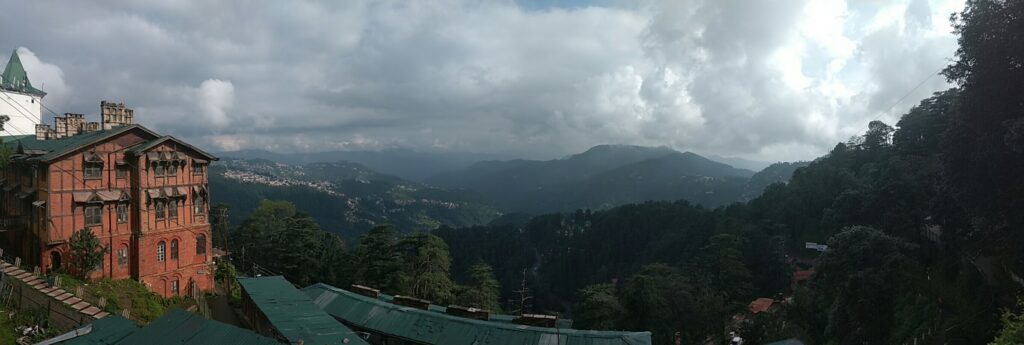
Huzoorra advised all communities to tolerate and respect the points of view of other communities. Unity is the key to success, and all communities should keep this need in mind for the country’s progress and prosperity.
Huzoorra then advised the Muslims to establish local committees in every town and city that should work for the betterment of the local Muslims. Huzoorra added that in order to instil a spirit of unity, these committees should be given a common name, and thus, he himself suggested the name “Jami‘at-ul-Ikhwan”.
Huzoorra also called the attention of the Muslims to their duty to preach the message of Islam far and wide.
In the end, Huzoorra said:
“When I teach about the establishment of peace, I also wish to say to the Hindus, Sikhs, Christians, and everyone who is present here, that though I am ever ready to make every sacrifice for the peace and conciliation, I declare it, and do it with great emphasis, [Hazrat Yaqub Ali Sahib Irfanirasays that at that moment Huzoor’s voice was very powerful and strong] that it is possible for us to make peace with the serpents and animals of the wilderness, but not with those who abuse and attack Muhammad Rasulullah, peace and blessings of Allah be upon him.” (Al Fazl, 23 September 1927, p. 6)
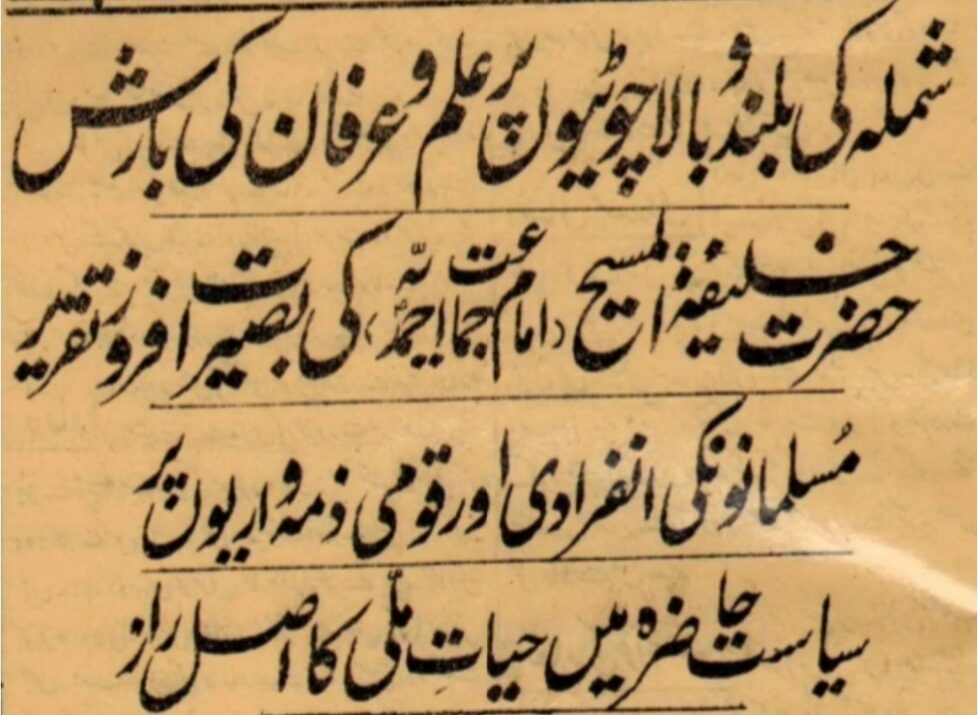
The Governor of Punjab meets Hazrat Musleh-e-Maudra
During this tour, the then Governor of Punjab, Sir William Malcolm Hailey, requested a meeting with Hazrat Musleh-e-Maudra through a letter. Therefore, on 17 September, the governor had the opportunity to meet Huzoorra. During this meeting, a discussion took place as to how the Hindu-Muslim unrest could be alleviated in the country. The meeting lasted for around an hour. (Al Fazl, 30 September 1927, p. 5)
It is important to mention here what views the Governor had towards the Jamaat. On 17 December 1924, when a deputation from the Ahmadiyya Muslim Jamaat presented an address to him, Mr Hailey “spoke of the interest with which he had watched the progress of the movement. While disclaiming any intention to speak of its theological aspects, he emphasised the fact that to the student of comparative religion, the value of movements, usually sectarian, lay mainly in their reaction to the attitude and beliefs of the main body of thinkers. ‘Students of religion,’ he said, ‘will watch with profound interest the effect which their movement may have on the Islamic world […].’ He welcomed the attitude they had adopted in purely temporal matters, for they had, as a community, shown themselves to be disciples of the doctrine that political improvement should be effected by reason and conviction, not by violent agitation or mass movement.” (The Civil and Military Gazette, 18 December 1924, p. 4)
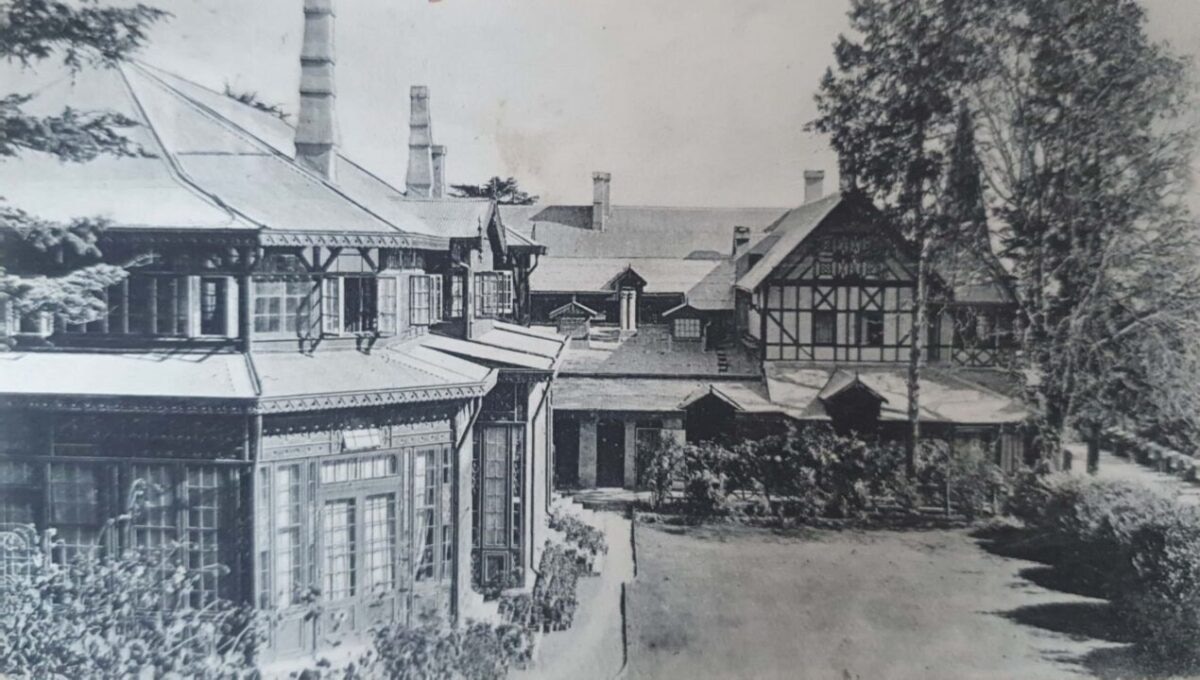
Jamiat-ul-Ikhwan for the unity and prosperity of Muslims
On 25 September 1927, Huzoorra granted an audience to the aggrieved Muslims of Shimla, at Kingsley. This joint session of Ahmadi and non-Ahmadi Muslims was held to establish the Jami‘at-ul-Ikhwan, the idea of which was proposed by Huzoorra himself during his lecture on 11 September. On this occasion, Huzoorra delivered a speech as well. (Al Fazl, 7 October 1927, p. 6)
Agriculture Minister of Punjab invites Hazrat Musleh-e-Maudra
On 28 September 1927, the then Agriculture Minister of Punjab, Sir Sardar Jogendra Singh, invited Hazrat Musleh-e-Maudra and his companions to a lunch reception, which Huzoorra graciously accepted.
During the meeting, the Minister requested Huzoorra to play his role in fostering peace and harmony between various communities of the country. He also commended the 20 proposals of Huzoorra, presented during the Unity Conference. The meeting continued for more than two hours. (Al Fazl, 7 October 1927, p. 6)
A testimony
In praising Hazrat Musleh-e-Maud’sra services, particularly in those circumstances, that have been mentioned above, a prominent Muslim leader, Muhammad Ali Jauhar, stated:
“It will be ungrateful if we do not mention respected Mirza Bashiruddin Mahmud Ahmad and his well-disciplined Jamaat, who have devoted all their efforts – irrespective of doctrinal differences – toward the welfare of the Muslims.” (Hamdard, 26 September 1927)
اِک وقت آئے گا كہ كہيں گے تمام لوگ
ملّت كے اس فدائى پہ رحمت خدا كرے
“The time will come when everyone will say, ‘May God have mercy on this devotee of the nation.’” (Al Fazl, 1 January 1955, p. 1)

